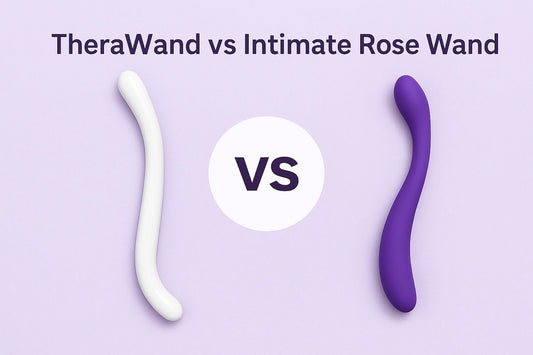There are several reasons why sex can become painful for women. Vaginal dryness, endometriosis, vaginal tightness, vaginismus, and pelvic floor disorders can all affect vaginal health and result in discomfort or pain during sex (dyspareunia). While the OhNut is known to limit penetration and prevent deep dyspareunia, it is not designed to treat the underlying causes of pain during sex in the long term.
If you are seeking to ease pain during sex due to endometriosis, vaginal dryness, menopause, pelvic scar tissue, childbirth, or pelvic floor dysfunction, here are some OhNut alternatives.
What Is the OhNut?
The OhNut is a set of adjustable rings that can be worn around the penis, or placed around a sex toy, to limit penetration depth and reduce discomfort during sex or play. OhNuts are known for their help in preventing the pain of deep penetration in women.
However, when painful sex is unrelated to depth, more effective solutions are available.
What Causes Pain During Sex (Dyspareunia)?
In women, painful sex can arise for several reasons and is typically connected to underlying physical or psychological factors. Some physical causes of dyspareunia may be temporary, pass with time, or relieved through medication or surgery.
These could include lack of sexual arousal, pelvic floor dysfunction, trigger points or tender points in the pelvic floor muscles, childbirth recovery, vaginal dryness during breastfeeding, ovarian cysts, pelvic organ prolapse, and allergic reactions to certain types of condoms.
Ongoing physical conditions that cause pain during sex include the following:
Vaginal Dryness - It occurs due to the absence of natural vaginal lubrication and may be caused by a lack of sexual arousal, certain medications, stress, or hormone fluctuations. Although vaginal dryness due to hormone fluctuations during breastfeeding normally subsides, vaginal dryness during menopause can linger due to permanently lowered estrogen levels.
Pelvic floor dysfunction - When pelvic trauma, surgery, childbirth, or other medical conditions cause the pelvic floor muscles to tighten or weaken, pelvic floor dysfunction can occur. Because the pelvic floor is designed to support the vagina, and intercourse, as well as the pelvic organs, pain during sex is common if the pelvic floor muscles are too tight or too loose. Pelvic floor muscles can also have trigger points or tender points that can drive pain.
Endometriosis - Develops when tissue similar to the uterus lining (endometrium) grows outside the uterus on organs like the ovaries and fallopian tubes. These growths can cause pain during menstruation, bowel movements, urination, and sex. Abdominal bloating, nausea, fatigue, depression, anxiety, and infertility are also common symptoms of endometriosis.
Vulvodynia - Triggered by vulvar trauma, hormone fluctuations, an overactive immune response, or an unknown cause, vulvodynia results in pain and a burning or stinging sensation in the outer genitals (vulva). It makes vaginal penetration and sex impossible for some and painful for most.
Fibroids - Uterine fibroids are non-cancerous growths that develop in the uterus. Those that increase in size or grow in certain locations can cause pain during sex and deep dyspareunia in particular. Fibroids sometimes shrink during menopause due to low estrogen levels or are removed via surgery.
Vaginal Infections or STIs - When the vaginal pH is disrupted, harmful bacteria can thrive and result in vaginal infections such as urinary tract infections (UTIs), yeast infections, or bacterial vaginosis. In addition to irritation and changes in vaginal discharge, pain during sex is a common symptom with vaginal infections.
Sexually transmitted infections such as chlamydia and gonorrhea are also known to cause pain during sex if left untreated.
Pelvic Inflammatory Disease (PID) - Typically occurs when vaginal infections or STIs are left untreated and the infections spreads to the upper reproductive organs like the fallopian tubes, ovaries, and uterus. With PID, deep dyspareunia is common.
Interstitial Cystitis (IC) - Interstitial cystitis is a chronic bladder condition that causes inflammation of the bladder and nearby tissues. The pelvic discomfort experienced with IC is typically exacerbated during sex.
What Psychological Factors Can Cause Pain During Sex?
Psychological causes of pain during sex can include previous sexual trauma, anxiety, depression, body issues, relationship problems, and performance pressure. Although each psychological issue may arise from a different experience or trauma, they can all manifest in the body as a condition known as vaginismus.
Vaginismus causes the vaginal and pelvic floor muscles to contract or tighten at the prospect of vaginal penetration. Essentially, when the brain correlates sex with pain, fear, or danger; it sends signals to the pelvic floor and vaginal muscles to tighten in protective mode. This tightening can cause severe pain during sex.
OhNut Alternatives for Easing Pain During Sex
Given the above outline of the most common causes of dyspareunia, it becomes clear that while the OhNut may prevent the pain of deep penetration, it cannot help or treat all causes of pain during sex.
The following OhNUt alternatives are recommended to address several different aspects of discomfort during sex.
1. Vaginal Dilators
Vaginal dilators are medical pelvic tools designed to gently and gradually improve mobility in tight vaginal muscles and pelvic floor muscles. Cylindrically-shaped, the best vaginal dilators are sold in sets of ascending sizes that range from the size of a tampon to an erect penis.
Women suffering from pain during sex are advised to use ample lubrication while inserting the smallest vaginal dilator in a set into the vagina. This allows the vaginal and pelvic floor muscles to relax while experiencing gentle penetration.
With time, the muscles will sufficiently relax to insert the smallest dilator pain-free, and then the next dilator is used until comfort is achieved. The process is continued until the dilator resembling the size of an average penis can be inserted without discomfort or pain.
Vaginal dilator therapy is a proven method of gradually relaxing tight vaginal and pelvic floor muscles for easing dyspareunia permanently to enjoy more enjoyable sex. They are most commonly used to ease sexual pain with endometriosis, as well as relieve vaginismus and pelvic floor dysfunction.
Vaginal dilators are also beneficial for new mothers to regain sexual confidence after perineal tearing during birth.
2. Lubricants for Vaginal Dryness
When vaginal dryness makes sex uncomfortable, the friction and micro-tearing can be so off-putting that many women completely refrain from sex. Common during the menopause transition and postmenopause due to lowered estrogen levels, vaginal dryness that causes pain during sex can be easily relieved with a personal lubricant.
Silicone-based lubricants are recommended for their long-lasting slippery glide without feeling too greasy and they are also considered safe for maintaining a balanced vaginal microbiome. For improved sexual arousal, you might consider letting your partner apply the lube.
Masturbation and vaginal dilators can also help improve the production of natural vaginal lubrication. However, if you're using vaginal dilators with a silicone coating, use a water-based lubricant instead of a silicone lube to prevent the silicone-on-silicone reaction from damaging the other layer of the dilator.
3. Topical Estrogen
Topical estrogen, also known as local hormone therapy, relieves vaginal dryness caused by hormone fluctuations during menopause. Because it is applied to the skin and does not pass through the liver, topical estrogen does not carry the same risks as systemic hormone therapy.
That said, hormone therapy is not suitable for every woman, so it's always best to consult a menopause expert above a GP to ensure that it's right for you.
4. Vaginal Moisturizers
Organically-made vaginal moisturizers can help replenish moisture and elasticity in the vulvovaginal tissues when used daily. Free from harmful synthetic ingredients known to upset the vaginal pH, organic vaginal moisturizers will not cause additional dryness or irritation.
5. Pelvic Physical Therapy
Pelvic physical therapy is one of the most effective methods of treating pelvic floor dysfunction, relieving dyspareunia, and improving sexual health. Trained to identify and treat pelvic floor disorders, pelvic physical therapists are a great place to start if you don't know what is causing your dyspareunia.
Treating tight pelvic floor muscles with Kegel Weights instead of vaginal dilators, for instance, will worsen pain and discomfort during sex rather than relieve it. The same applies to using vaginal dilators to treat weak pelvic floor muscles.
Pelvic Physical Therapists may also recommend using a pelvic wand to address trigger points in the pelvic floor muscles. The wand is a tool to gently massage sore muscles to eliminate pelvic pain and pain with intercourse.
6. Sex Therapy
When vaginismus, dyspareunia, lack of sexual arousal, or vaginal dryness is connected to psychological factors such as previous sexual trauma, anxiety, body issues, or performance pressure a sex therapist of counsellor can be helpful.
Working through emotional issues, psychological triggers, or fears surrounding sex can relieve and improve physical symptoms like vaginismus, lack of arousal, and vaginal dryness.
Conclusion
While the OhNut offers a physical solution to pain during deep sexual penetration, it is not the answer for every woman experiencing pain during sex. Given that there are several causes of dyspareunia, identifying and treating the underlying issue for a long-term solution is more beneficial than using an OhNut to prevent pain during every sexual encounter.
For example, vaginal dilators are an effective way of treating endometriosis, vaginismus, a tight pelvic floor, and vaginal dryness. Kegel weights are highly recommended for relieving dyspareunia caused by weak pelvic floor muscles. Personal lubricants and organically-made vaginal moisturizers are helpful to moisturize and improve tissue elasticity when vaginal dryness during menopause is the cause of dyspareunia.
When psychological factors are causing physical symptoms that contribute to pain during penetration and sex, consulting with a sex therapist can help address the underlying emotional issues for long-term understanding and relief.
References
Mayo Clinic - Painful Intercourse (Dyspareunia) https://www.mayoclinic.org/diseases-conditions/painful-intercourse/symptoms-causes/syc-20375967#
American College of Obstetricians and Gynecologists - Experiencing Vaginal Dryness? Here's What you Need to Know - https://www.acog.org/womens-health/experts-and-stories/the-latest/experiencing-vaginal-dryness-heres-what-you-need-to-know
Cleveland Clinic - Pelvic Floor Dysfunction - https://my.clevelandclinic.org/health/diseases/14459-pelvic-floor-dysfunction
The World Health Organisation - Endometriosis - https://www.who.int/news-room/fact-sheets/detail/endometriosis
National Vulvodynia Association - What is Vulvodynia? - https://www.nva.org/what-is-vulvodynia/
Better Health Channel - Pelvic Inflammatory Disease - https://www.betterhealth.vic.gov.au/health/healthyliving/pelvic-inflammatory-disease-pid#
Urology Care Foundation - Interstitial Cystitis - https://www.urologyhealth.org/urology-a-z/i/interstitial-cystitis
The pelvic Hub - The Best Vaginal Dilators - https://www.thepelvichub.com/blogs/pelvic-pain/best-vaginal-dilators?
Gynecology Collaboration - Local Hormone Therapy - https://gynqi.com/local-hormone-therapy-basic/
Middlesex MD - Am I using Kegel Weights Wrong? - https://middlesexmd.com/blogs/drbarb/46977667-q-am-i-using-kegel-weights-wrong?



